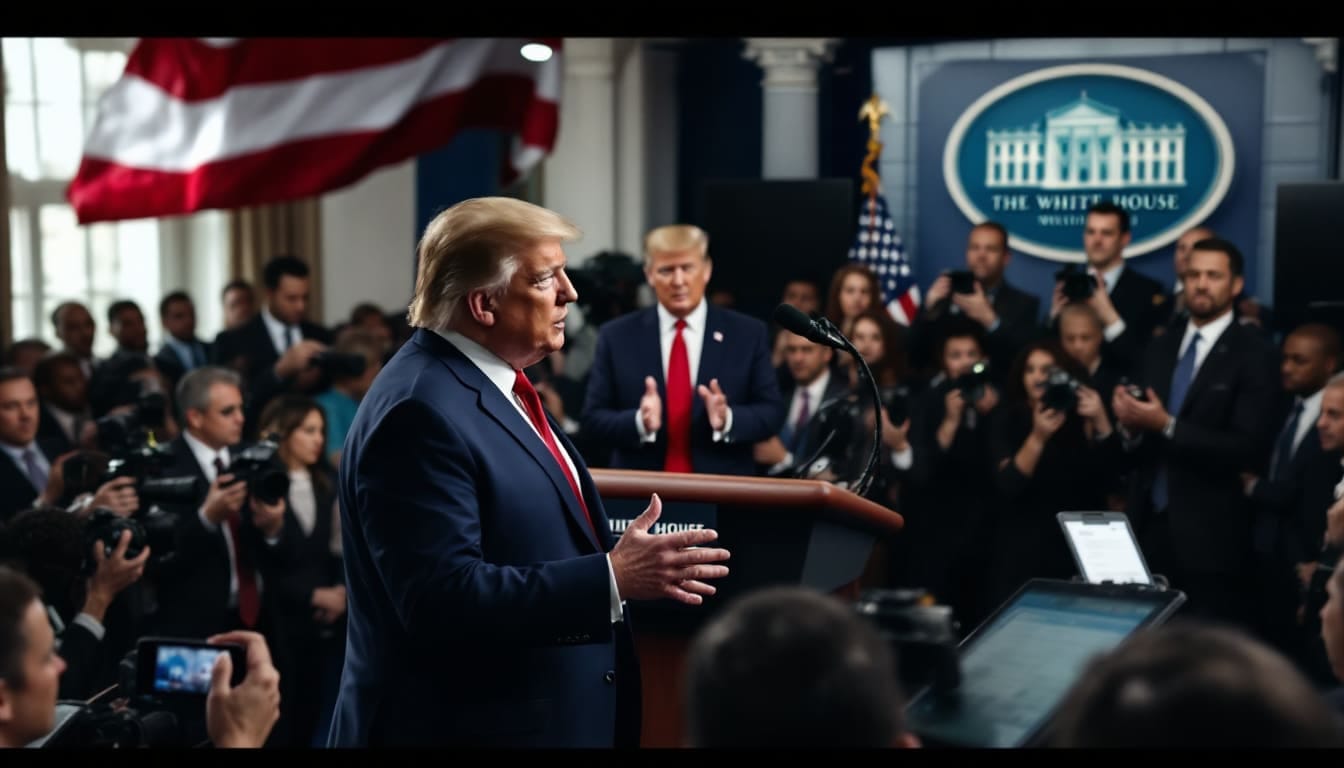Your activity and your behavior on this site have raised suspicions regarding your nature as a bot. Several factors may explain this situation. It is essential to understand the detection mechanisms that have been implemented.
If you are using a private network or an anonymous proxy, it is recommended to disable it and try again. Activities previously considered malicious may have been associated with your network. To restore access, it may be necessary to request an unblock from the site administrators. Adopting secure browsing practices also helps to avoid such inconveniences.
Table des matières
ToggleDonald Trump’s announcement: what are the new customs tariffs?
In May 2018, Donald Trump announced an increase of 25% in customs tariffs on car imports to the United States. This decision is part of a broader strategy aimed at protecting the American automotive industry against international competition. According to Trump, this measure aims to correct the trade imbalance and encourage foreign manufacturers to invest more in the United States.
Why a 25% increase on imported vehicles?
The decision to impose a 25% increase on imported vehicles stems from several economic and political factors. First, the Trump administration seeks to reduce the United States’ trade deficit by increasing the costs of foreign products. Additionally, this measure aims to stimulate local production by making imported cars less competitive in the American market. By applying these tariffs, the government hopes to encourage foreign companies to build manufacturing plants in the United States, thereby creating jobs and strengthening the national economy.
This protectionist policy is part of a global trend where several countries are revising their trade agreements to favor local production. However, this increase in tariffs may also lead to tensions with the United States’ trading partners, notably the European Union, which may respond by imposing equivalent sanctions on American products.
To learn more about Trump’s initial forecasts regarding this announcement, see this article: Donald Trump predicts an imminent announcement of a 25% customs tariff on the European Union by the United States.
Impact on the American automotive industry and importers
The increase in customs tariffs of 25% has significant repercussions for the American automotive industry and its players. Importers of foreign cars are faced with increased costs, which may translate into higher prices for American consumers. This increase could slow down sales of imported vehicles, thereby affecting the revenues of dealerships and international manufacturers present in the United States.
Moreover, American companies partnering with foreign manufacturers may find their business relationships strained, potentially leading to reduced investments and collaborations. Some manufacturers may decide to relocate their factories in response to these new taxes, while others might absorb the additional costs to remain competitive.
According to a study by InoIndustry, tensions over customs tariffs can also influence the raw materials market, such as aluminum, used in vehicle manufacturing. An increase in import costs could prompt manufacturers to seek local alternatives, thereby strengthening the national supply chain.
Reactions from trading partners and the European Union
Trump’s announcement has sparked strong reactions from the United States’ trading partners, particularly from the European Union. The latter expressed its opposition by indicating that these tariffs violate international trade agreements and threatened retaliatory tariffs on American products. This escalation could lead to a trade war, affecting not only the automotive industries but also other economic sectors.
European leaders have called for a negotiated solution to avoid deteriorating economic relations. Discussions are underway to find a compromise that would reduce tariffs while addressing American concerns regarding fair trade and the protection of local industries.
Meanwhile, other U.S. trading partners, such as Canada and Mexico, are closely monitoring the situation, fearing similar repercussions on their own industries. Therefore, the overall impact of this decision could extend well beyond the automotive sector, affecting various aspects of international economic relations.
Adaptation strategies for manufacturers in the face of new customs tariffs
In light of the new customs tariffs, manufacturers must adopt adaptation strategies to minimize negative impacts and seize new opportunities. One of the main strategies is to reassess and optimize the supply chain. By reducing reliance on imports, businesses can mitigate the additional costs incurred by the tariffs. This may include seeking local suppliers or developing partnerships with American companies.
Furthermore, automotive manufacturers may consider investing in local production in the United States. By establishing plants on American soil, companies can not only avoid customs tariffs but also benefit from tax incentives and subsidies offered by the U.S. government to support the domestic industry.
Another approach is to innovate in vehicle technologies to differentiate products in the market. By offering more environmentally friendly, fuel-efficient, or technologically advanced vehicles, manufacturers can justify a better market positioning, thereby compensating for the additional costs associated with tariffs.
To discover testimonials and specific strategies adopted by manufacturers in response to the rise in tariffs, see this article: How manufacturers adapt to the American assault on customs tariffs: testimonials and strategies.
Medium and long-term perspectives for the global automotive market
In the medium and long term, the 25% increase in customs tariffs by the United States could reshape the landscape of the global automotive market. On one hand, this measure could encourage the localization of production, fostering a reduction of globalized supply chains and strengthening local economies. It could also stimulate innovation and competitiveness among local manufacturers, who would be incentivized to improve their offerings to meet domestic demand.
On the other hand, a prolonged trade war could hinder global economic growth, affecting international trade and foreign direct investment. Tensions between major economic powers could lead to a fragmentation of the global market, with distinct trading blocs forming in response to protectionist policies.
Furthermore, consumers may feel the effects of this tariff increase through higher prices and a reduced diversity of available offerings in the American market. However, it could also stimulate increased awareness of local production and the associated benefits, such as reducing the carbon footprint linked to the transportation of imported vehicles.
In conclusion, while this decision poses significant challenges, it also offers opportunities for a strategic realignment of players in the automotive industry, fostering a necessary adaptation in a constantly evolving economic context.





